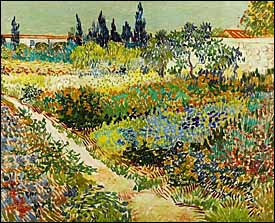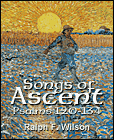
|
Old Testament
New Testament
Gospels
Acts
Paul's Letters
General Letters
Revelation
Topical Studies
Beginning the Journey (for new Christians). en Español

|
Old Testament
New Testament
Gospels
Acts
Paul's Letters
General Letters
Revelation
Topical Studies

|
Home
Bible Studies
Articles
Books
Podcasts
Search
Menu
Donate
About Us
Contact Us
FAQ
Sitemap
14. Psalm 133. The Beauty of Unity
 Vincent Van Gogh, 'Garden at Arles' (1888), oil on canvas, 32 x 40 in, Kunstmuseum The Hague, Netherlands. |
Few psalms surpass this short, three-verse psalm in the power of its imagery. In my mind, it ranks up there with the word picture of "The Lord is my shepherd...." We have oil poured on the head, then imagine its viscous fluid running down on the beard and clothing, and finally, the thought of abundant dew on the mountains. The theme of this psalm expresses a longing that we all have -- love, acceptance, the comfort of being cared about. It is a delightful psalm that some have classified as a wisdom psalm, but I think it overflows that designation.
"A Song of Ascents. Of David
1 Behold, how good and pleasant it is
when brothers dwell in unity!
2 It is like the precious oil on the head,
running down on the beard,
on the beard of Aaron,
running down on the collar of his robes!
3 It is like the dew of Hermon,
which falls on the mountains of Zion!
For there the LORD has commanded the blessing,
life forevermore." (Psalm 133:1-3, ESV)
Brothers Living Together in Unity (Psalm 133:1)
The first line presents the theme.
"Behold, how good and pleasant it is
when brothers dwell in unity!" (Psalm 133:1)
The key term here is "yaḥad, "unitedness, union, association, community,"175 from the verb yāḥad, "be united, be joined." Every other phrase in this short psalm amplifies and informs this word. The single purpose of this psalm is to exalt the value and virtue of unity. Let's consider Psalm 133 carefully, taking time to allow its words and images to settle in our hearts and affix themselves to our souls.
Good and Pleasant (Psalm 133:1)
"How good and pleasant it is
when brothers176 live together in unity!
The first words we see are "good" and "pleasant." The root of "good" refers to "good" or "goodness" in its broadest senses. Depending upon the context, the word can carry meanings such as, "good, pleasant, beautiful, delightful, glad, joyful, precious, correct, and righteous." Hebrew often uses ṭôb where in English we would say something like "beautiful" or "expensive." It may also include the ideas of superior quality or relative worth.177
The word "pleasant" is a close synonym. It means "sweet, lovely, agreeable."178 The root is used to describe David as the "sweet" psalmist of Israel (2 Samuel 23:1), the physical beauty of two lovers in the Song of Solomon (1:16; 7:6), the taste of bread (Proverbs 9:17), and the music of the lyre (Psalm 81:2). The words themselves carry associations of beauty, joy, and loveliness.
Unity Is Like Perfumed Oil Generously Poured Out (Psalm 133:2)
Now the psalmist introduces the smell and feel of the perfumed olive oil179 used for anointing in the temple.
"It is like precious oil poured on the head,
running down on the beard,
running down on Aaron's beard,
down upon the collar of his robes." (Psalm 133:2)
In the Bible, oil becomes a symbol of prosperity and blessing (Deuteronomy 32:13; 33:24; Psalm 92:10). It is referred to as "the oil of joy" (Isaiah 61:3; Psalm 45:7). An honored guest would be anointed with oil as an act of generous hospitality, as in the 23rd Psalm: "You anoint my head with oil; my cup overflows" (Psalm 23:5). In Jesus' day, putting oil on a guest's head was considered the act of a gracious host (Luke 7:46).
But in Psalm 133, this isn't just olive oil. It is "precious" oil, probably perfumed. The adjective here is ṭôb that we saw in verse one, in the sense of "beautiful, expensive." The New Jerusalem Bible renders it "fine oil."
And it isn't just a little dab.180 This oil is poured181 until it begins to run off the hair, down onto the beard, and then even onto the recipient's robes.182 I would worry about staining my clothes. But the figure here is used to suggest abundance, extravagance, overflowing blessing. Aaron is mentioned because he is anointed as high priest by Moses (Exodus 30:25-30; Leviticus 8:12). We see the same image when Jesus is anointed by a woman with expensive perfume. The point is the excess, the extravagance of this act of worship. Love is like that.
Unity Is Like Heavy Dew (Psalm 133:3)
"It is as if the dew of Hermon
were falling on Mount Zion.
For there the LORD bestows his blessing,
even life forevermore." (Psalm 133:3)
Mount Hermon is a high, snow-covered mountain on the border between Syria and Lebanon, the highest mountain in the lands of the Bible, 9,230 feet (2,814 meters). George Adam Smith observes, "The dews of Syrian nights are excessive; on many mornings it looks as if there had been heavy rain...."183 The dew that falls on the slopes of Mt. Hermon is copious. Mount Zion, on the other hand, is a poetic term for the city of Jerusalem. The psalmist seems to be saying that unity of brothers can be compared to the proverbial heavy dew of Mount Hermon descending upon Jerusalem. Kirkpatrick expresses it this way:
"Dew is a symbol for what is refreshing, quickening, invigorating. The psalmist compares the influence of brotherly unity upon the nation to the effect of dew on vegetation. From such dwelling together, individuals draw fresh energy; the life of the community, social and religious, is revived and quickened."184
The Dream of Unity
In our fractured world, unity is difficult. As I write this, nationalism is on the ascendency, while unity and globalism is in decline. Even the European Union finds unity difficult. All too frequently peace has been shattered by regional and world wars.
The Beatles' song, "Imagine" expresses the longing for something better than this.
"You may say I'm a dreamer,
But I'm not the only one.
I hope someday you'll join us
And the world will be as one."185
Sadly, the Beatles were unable to accomplish this goal of the brotherhood of man.
And it has eluded churches too. We have separatist churches that refuse to fellowship with others that might have some different understandings of the Bible. Too often, such groups see doctrinal purity and separation from "worldly Christians" as their prime distinctives. It is because of such attitudes that the world views the Protestant church splintered into hundreds of self-righteous pieces.
True brotherhood can't be achieved by world-renowned rock stars and winsome songs. It is only possible by the power of the Holy Spirit working in us.
Unity = Agapē
Unity is not some kind of evil compromise! Unity is love working itself out amidst the difficulties that otherwise tend to divide people. Psalm 133 teaches us that true unity is beautiful, a thing to behold. The most important New Testament word embraces this theme: agapē ("love").
When asked what is the most important commandment in the Torah, Jesus answers,
"You shall love the Lord your God with all your heart and with all your soul and with all your mind. This is the great and first commandment. And a second is like it: You shall love your neighbor as yourself." (Matthew 22:37-39)
Love, agape, is the only foundation that unity can exist upon. Paul writes,
"Love is patient and kind; love does not envy or boast; it is not arrogant or rude. It does not insist on its own way; it is not irritable or resentful; it does not rejoice at wrongdoing, but rejoices with the truth. Love bears all things, believes all things, hopes all things, endures all things. Love never ends." (1 Corinthians 13:4-8a)
Jesus told his disciples:
"A new command I give you: Love one another.
As I have loved you, so you must love one another.
By this all men will know that you are my disciples,
if you love one another." (John 13:34-35)
Organizations that bring together individuals and nations in common purpose are good, but without love they fall short. The only way to achieve the good and pleasant unity pictured in Psalm 133 is through love inspired and enabled by the Holy Spirit. Indeed, love is the mark of an authentic follower of Jesus. Won't you make it your prime directive?
Prayer
 Available in paperback, PDF, and Kindle formats. |
Father, we can picture the beauty of unity, but too often we fall so short of realizing it. Fan the flames of your love in our hearts so that true unity can be possible, centered in Jesus Christ our Lord. In his name, we pray. Amen.
Meditation
Day 14 Meditation (Psalm 133). Which word pictures in Psalm 133 do you find most compelling? Why do you think lasting unity is so hard to achieve in our world, in our countries, in our churches, in our families? What do you think is the chief obstacle to love in your life? https://www.joyfulheart.com/forums/topic/1913-14-unity/
Endnotes
[175] Paul R. Gilchrist, yāḥad, TWOT #858b; Holladay 132b.
[176] "Brothers" is the plural of ʾāḥ, "brother," then "relative, fellow countryman, friend." The plural can extend to all the children of Israel generally, as the parallelism with "brothers" shows (Leviticus 25:46: Deuteronomy 3:18). While the Greek plural of "brothers" can include brothers and sisters (adelphos, BDAG 18, 1), I don't have any indication that this usage extends to Hebrew.
[177] Andrew Bowling, ṭôb, TWOT #793a.
[178] Marvin R. Wilson, nā'ēm, TWOT #1384b.
[179] "Oil" (NIV, NRSV) or "ointment" (KJV) is the common word shemen, "oil," either of pure olive oil or prepared for various uses such as perfume or ointment. Kings and priests were anointed with oil and it became important in cosmetics and perfumery.
[180] Brylcreem, introduced in 1928, was a hair cream that advertised with the jingle, "A little dab will do ya!"
[181] The word "poured" is implied. It isn't in the Hebrew text.
[182] "Skirts" (KJV) or "collar" (NRSV, NIV, ESV) is peh, "mouth," here used figuratively of the top opening of the robe (Victor P. Hamilton, peh, TWOT #1738).
[183] George Adam Smith, The Historical Geography of the Holy Land (Seventh Edition; New York: A.C. Armstrong and Son, 1900).
[184] Alexander Francis Kirkpatrick (ed.), The Book of Psalms (Cambridge University Press, 1906), p. 771.
[185] John Lennon and Yoko Ono, "Imagine" (1971).
Copyright © 2026, Ralph F. Wilson. <pastor![]() joyfulheart.com> All rights reserved. A single copy of this article is free. Do not put this on a website. See legal, copyright, and reprint information.
joyfulheart.com> All rights reserved. A single copy of this article is free. Do not put this on a website. See legal, copyright, and reprint information.


 To be notified about future articles, stories, and Bible studies, why don't you subscribe to our free newsletter, The Joyful Heart, by placing your e-mail address in the box below. We respect your
To be notified about future articles, stories, and Bible studies, why don't you subscribe to our free newsletter, The Joyful Heart, by placing your e-mail address in the box below. We respect your